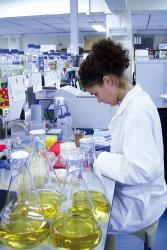What happens to biopsy tissue after it's tested? Your donated cells could be helping important cancer research
![]() This article by , Postdoctoral Research Officer in Cancer Biology at the School of Medical Sciences is republished from under a Creative Commons license. Read the .
This article by , Postdoctoral Research Officer in Cancer Biology at the School of Medical Sciences is republished from under a Creative Commons license. Read the .
If you’ve ever had a tumour removed or biopsy taken, you may have contributed to . People are often asked to give consent for any tissue that is not needed for diagnosis to be used in other scientific work. Though you probably won’t be told exactly what research your cells will be used for, tissue samples like these are diagnosis and treatment of a whole range of illnesses and diseases. But once they’re removed, how are these tissue samples used exactly? How do they go from patient to project?
 When tissue is removed from a person’s body, most often it is immediately put into a chemical preservative. It is then taken to a lab and embedded in a wax block. Protecting the tissue like this retains its structure and stops it from decomposing so it can be stored at room temperature for long periods of time.
When tissue is removed from a person’s body, most often it is immediately put into a chemical preservative. It is then taken to a lab and embedded in a wax block. Protecting the tissue like this retains its structure and stops it from decomposing so it can be stored at room temperature for long periods of time.
This process also means that biochemical molecules like protein and DNA are preserved, which can provide vital clues about what processes are occurring in the tissue at that stage in the person’s illness. If we were looking at, for example, whether but not in others (which would make it helpful for diagnosis) we would want a large number of each type to test. But there may not be enough patients of each type currently in treatment, so it is useful to have a library of samples to draw from.
Or we might want to test if patients with tumours containing molecule B are less likely to survive for five years than those without this molecule. This sort of question requires samples with a follow-up time of at least five years. But the answer may help doctors decide whether they need to treat their current patients with B more aggressively or with a .
To analyse tissues, lab scientists cut very thin slices from the wax blocks and view them under a microscope. The slides are stained with dyes that show the overall tissue structure, and may also be stained with antibodies to show the presence of specific molecules.
Studies often need large numbers of samples from different patients to adequately answer a research question, which can take some time to collect. Take my work for example. My team is interested in finding more about a protein called brachyury, and how it relates to bowel cancer. But to do this we need to compare lots of samples, so we are using tissue from 823 bowel cancer patients and 50 non-cancer patients in our research.
When not in use, the tissue blocks are – with patient consent – placed in a store that researchers can access. The UK has several of these stores, known as biobanks or biorepositories, holding all kinds of tissues. Some cancer biobanks also store different kinds of tumours and blood samples.
While there are available on how many samples are held in all biobanks, or how often they are used, we do know these numbers are significant. The Children’s Cancer and Leukaemia Biobank alone has banked . The Northern Ireland Biobank 2,062 patients consented for their tissues to be used in research between 2017-2018, and 4,086 samples were accessed by researchers in that period.
Identifying biomarkers
Projects that use biobanks are often trying to identify biomarkers. These are any biological characteristics that give useful information about a disease or condition. Our team is looking at whether the protein brachyury is a useful biomarker to improve bowel cancer diagnosis.
Brachyury is essential for early embryonic development, but it is switched off in most cells by the time you are born. However, finding brachyury in a tumour indicates a poorer outcome for the patient. But to work out if this link is correct, we need to look at biobank samples. Doing this will help us work out more accurately which patients are at higher risk of cancer recurrence or metastasis. This is important when doctors are deciding on the best course of treatment.
In our research, we also need clinical details, such as what happened to the patient and all the information available at the time of diagnosis. Then we can assess whether testing for brachyury would have added useful information to the diagnosis. Information that accompanies each block is anonymised, which means the researcher analysing the data won’t know the patient’s name or be able to identify them from the sample. But they can see any relevant clinical details such as tumour stage, age, sex and survival.
Biobank samples have had already improved treatment of childhood acute lymphocytic leukaemia. Samples from the Cancer and Leukaemia Biobank were used to demonstrate that children with an abnormality in chromosome 21 had poorer outcomes that those without it. This led to treatment being modified for these children so they are .
People are often applauded for raising money for research by undertaking gruelling or inventive challenges. Patients who decide their tissue can be used in research should be similarly applauded. Without their unique and valuable gift, we wouldn’t be able to further our understanding, diagnosis and treatment of all kinds of illnesses and diseases.
Publication date: 20 August 2019
